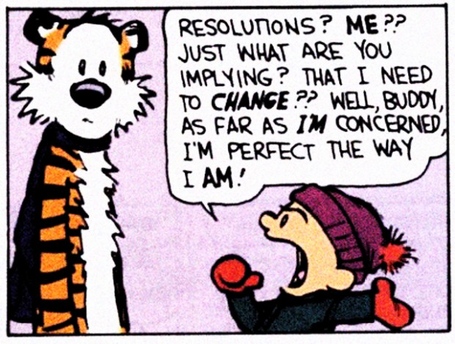Need Help with Your New Year’s Resolutions?
Unless you possess the inimitable confidence of Calvin in the cartoon strip below odds are you’ve made a few New Year’s resolutions.
After all, lots of us face the prospect of another new year resolved to break some bad habits and take up some good ones. The vast majority of us, however, have given up on our resolutions before the month’s out. But if you truly want to change yourself for the better in 2013, then you’ll do well to pay attention to these three research-driven tips.
Pick One
The first step in making a dent in your New Year’s list of dos and don’ts might just be to chuck the list itself. According to Roy Baumeister and John Tierney in their book Willpower, it’s incredibly difficult to make a change in more than one area of your life at a time. Why? Because each of us has only a limited supply of willpower, and we deplete our store anytime we try to ward off some temptation or persevere in some new virtue. That means that resisting the cookies at the office all day makes it incredibly difficult not to light up on your break. So choose which habit you want to quit first and conserve your willpower for that priority. Only after that task doesn’t tax you anymore (and odds are you’ll know), can you then move to a new resolution.
Be Careful Whom You Tell
As Derek Sivers shares in his succinct TED Talk (placed at the end of this post), it’s often better to keep your goals to yourself. Counter to our intuition, sharing our aspirations with others doesn’t encourage us to persevere or keep us accountable. Instead, the immediate gratification we receive from others congratulating us on our lofty ambitions substitutes for the delayed gratification of actually achieving them. Sure, the good vibes we get when we tell our friends we plan to take up swimming in the new year isn’t the same as the great feeling of having a leaner body and better endurance. But it’s close enough to make it that much harder to do the hard work of dragging ourselves to the pool every morning. If you really need to tell someone, enlist that person to help keep you accountable by, for instance, checking in weekly on how you’re doing. Better yet, find someone to partner with you in your new endeavor, as the camaraderie and mutual encouragement you give each other will strengthen your resolve greatly.
Imitate Santa
Whatever you may think constitutes “naughty and nice,” there’s little doubt about the power of “making a list and checking it twice.” Checklists are effective for at least three reasons. 1) Writing things down, as Baumeister and Tierney point out, allows you to take all kinds of good but often scattered thoughts and intentions and organize them, reducing stress and conserving energy to accomplish your goals rather than worry about them. 2) As surgeon and author Atul Gwande writes in his The Checklist Manifesto, lists allow you to break up large, complex tasks into smaller and more reasonable chunks of work that can guide your actions even during the most stressful of circumstances. 3) Checklists also give you the satisfaction of making demonstrable progress on your project. As Martin Seligman has pointed out in his book Flourish
nothing substitutes for building self-confidence and greater resolve than actually accomplishing something. Striking off even small items on your list increases your confidence to take on larger tasks. To enjoy all of these benefits, however, the items on your list have to be written as specific actions, not larger goals or outcomes. So whereas writing “start diet” is a recipe for failure, breaking that into “choose a diet program,” “make a food list,” “go to the store,” and “plan for time for cooking in my daily routine” can jump start your efforts.
While even the best research can’t make modifying habits easy – sustained change takes time and effort – your chances of success increase markedly as you pick one goal, enlist help rather than announce your intentions, and get organized and hold yourself accountable by using checklists. Who knows: armed with the latest research and counsel, perhaps 2013 will be your best year yet.
Note: If you are receiving this post by email, you may need to click here to watch the video.








Recent Comments